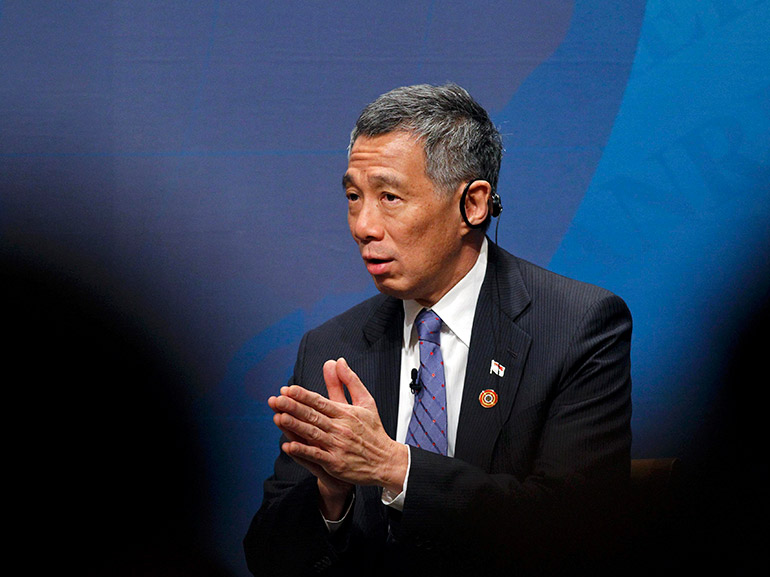Disruptive
The world is in the grip of a financial revolution. For centuries, the economic system was the sole preserve of banks, brokerages and trading houses, but now a technological upheaval is redefining how money flows from one place to another.
Fintech – a portmanteau of financial technology – is an industry that has seen extraordinary growth in recent years, and Singapore is positioning itself to take full advantage of this emerging new market.
As the term suggests, financial technology utilises technology, such as the internet or apps, to provide some kind of financial service. One prominent example is PayPal, which uses web-based technology to allow its customers to make and receive payments online without the need for physical buildings or infrastructure like a traditional bank. Another example is crowdfundng platform Kickstarter, which allows anyone to pledge money to help get creative projects off the ground.

Considering the likes of PayPal and Kickstarter, a word that often goes hand in hand with fintech is ‘disruption’, because technology can allow individual entrepreneurs to perform on a level playing field with huge corporations. An app may allow one person to lend money directly to another via an electronic transfer, without the borrower having to go to a bricks-and-mortar bank and fill in forms or speak to a member of staff – with all the added overhead costs the bank incurs. By doing this, that lender has potentially taken business from that bank and, in doing so, ‘disrupted’ the natural order of things – all just using an app.
According to a recent study by Accenture, investment in Asia-Pacific fintech more than quadrupled in 2015 to $4.3 billion, making it the second-biggest region for fintech investment after North America. Singapore has instigated a range of measures designed to boost its fintech industry, many of which are aimed at encouraging new business ventures.
The world’s first ‘smart nation’
In 2014, Prime Minister Lee Hsien Loong announced plans to make the city-state the world’s first ‘smart nation’ by 2030, using technology to improve the economy and enhance the standard of living. The Monetary Authority of Singapore, Singapore’s central bank and financial regulator, is also helping create a ‘smart financial centre’ where technology is used to increase efficiency and create opportunities.
The project has led to the formation of the Financial Sector Technology and Innovation scheme, an initiative that aims to allocate $168m over the next five years to encourage financial institutions to collaborate with fintech startups. Also, this May saw the unveiling of the Fintech Office, which has been set up to nurture and develop startups.
“Singapore’s government and regulators are supporting fintech,” said Jon Allaway, who leads Accenture’s financial services practice in the region. “Singapore is also engaging startups by mentoring them and working with them to figure out where the holes or potential problems are.”

This support for startups has already started to deliver rewards. Earlier this year, a report by Ernst & Young for the UK Treasury put Singapore fourth in terms of importance in the global fintech industry – after the UK and the west and east coasts of the US, with the latter two being evaluated separately.
Rating it above other emerging fintech centres such as Germany, Australia and Hong Kong, the report said Singapore was now the “preferred gateway into the Asian market” and that all but a dozen of the approximately 210 fintech firms operating in Singapore have opened in the past two years – the fastest growth rate in Asia.
Founded in 2010 in Copenhagen with the core mission of supporting the world’s best entrepreneurs, Startupbootcamp Global currently runs 14 programmes in major startup hubs including London, New York, Berlin and Amsterdam. Startupbootcamp Fintech Singapore, its Singapore fintech accelerator, provides funding, mentorship and office space as well as access to a global network of corporate partners, mentors, investors and venture capitalists.
“One of Singapore’s major startup ecosystem strengths is its international network of entrepreneurs who can help facilitate overseas growth,” said Andy Shannon, head of global operations at Startupbootcamp Global.
Focus on Asia
However, Singapore and Southeast Asia are benefiting from the fintech revolution due to the coming together of numerous forces. One is that much of Southeast Asia has no access to banking services, with research by McKinsey and Company finding that 59% of the region’s adult population are unbanked.
But Asia also makes up almost half of the world’s internet users. Add the fact that Southeast Asia has a booming consumer class, and the outlook is perfect for high-tech financial services to fill any gaps left by the bigger players.
“Finance is one of the world’s oldest industries, and there will always be a need for services around buying goods and borrowing money,” Shannon said. “While finance has been slower than some industries to adopt innovation, we see this trend quickly changing… The pace of fintech growth and user adoption will only increase in the near future with millions of people gaining access to core technologies that enable financial transactions to take place in a quicker and easier way.”
One company feeling the benefit of Singapore’s flourishing fintech ecosystem is OTDocs.com. It provides an electronic communications network that lets companies working in the international trade and supply train industries securely manage the flow of documents.
CEO Roberto Capodieci said: “Singapore is for sure a good base for our industry as it is one of the major ports in the world, thus providing us with access to key companies and entities in the industry. By making it easy to both invest and start up in Singapore, together with good support from local businesses and government, [Singapore] will for sure make [itself] the number one fintech location in Asia.”
Global alliances in fintech
In the globalised world, Singapore has also realised the importance of forging alliances. In June, the city-state signed a cooperation agreement with the Australian Securities and Investments Commission. The deal is designed to allow fintech firms in Singapore and Australia to speed up the process of entering each other’s markets.

And in May, the UK signed its first ever fintech bridge when it agreed to a deal with Singapore that will help British fintech firms and investors access the Asian market and expand to Singapore, as well as attracting Singaporean fintech companies and investors to the UK.
Cynthia Siantar, co-founder at Singapore firm Call Levels, a financial price monitoring and notifications app, welcomed the UK move.
“With this historic cooperation, Singapore’s prominence in the fintech industry will definitely rise globally, especially since London is widely regarded as the fintech capital of the world,” she said. “Singapore will thus gain greater recognition in Asia as the government continues to build it as a smart financial centre.”
With a population of just under 5.4 million, despite having a tech-savvy population, Singapore undoubtedly has a smaller user base than many other countries, which means fewer potential customers and a smaller pool of tech talent from which to recruit.
Competing with global super cities such as New York and London for that tech talent could also prove problematic.
“I can’t deny that our initial user base in Singapore was inevitably small as we have a very small population compared to major countries like the US and UK,” said Siantar. “Achieving organic growth in a small country is undoubtedly much more difficult. Fortunately, due to the proliferation of technology, digital media and social media, we are able to effectively promote our app to overseas users via various channels and we have been acquiring huge number of users from the US, UK, Middle East and other parts of Asia.”
Singapore startup Touche lets businesses receive payments, facilitate membership and loyalty programmes, and gather relevant data about customers by scanning their fingerprints, allowing for a more personalised service and reducing the threat of identity theft. In July it announced it had raised capital funding of $2m to pay for further development and production of its devices.
CEO Sahba Saint-Claire, though, says a lack of skilled staff willing to work for a startup could pose a problem for his growing company.
“The only challenge is finding people with the right skills that we can afford and [that] are willing to work for a startup,” he said. “This is not unique to this market. The government recognises this area of developmental growth and is taking steps to remedy the situation. It will take a few years though.
“I have no doubt in my mind that Singapore will continue to grow as a fintech hub,” he added. “We need to encourage local talent and allow companies to import much-needed talent to continue the innovation trend.”


